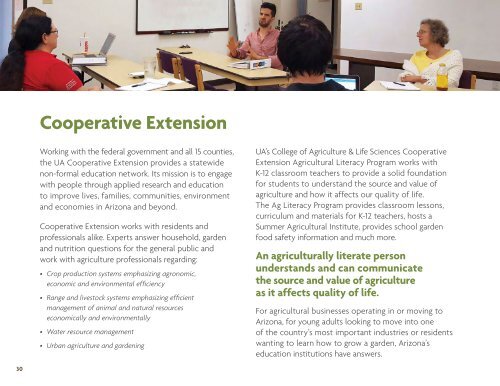Guide to Arizona Agriculture
AZDA_GuideToAZAg-R5
AZDA_GuideToAZAg-R5
You also want an ePaper? Increase the reach of your titles
YUMPU automatically turns print PDFs into web optimized ePapers that Google loves.
Cooperative Extension<br />
Youth<br />
Working with the federal government and all 15 counties,<br />
the UA Cooperative Extension provides a statewide<br />
non-formal education network. Its mission is <strong>to</strong> engage<br />
with people through applied research and education<br />
<strong>to</strong> improve lives, families, communities, environment<br />
and economies in <strong>Arizona</strong> and beyond.<br />
Cooperative Extension works with residents and<br />
professionals alike. Experts answer household, garden<br />
and nutrition questions for the general public and<br />
work with agriculture professionals regarding:<br />
• Crop production systems emphasizing agronomic,<br />
economic and environmental efficiency<br />
• Range and lives<strong>to</strong>ck systems emphasizing efficient<br />
management of animal and natural resources<br />
economically and environmentally<br />
• Water resource management<br />
• Urban agriculture and gardening<br />
UA’s College of <strong>Agriculture</strong> & Life Sciences Cooperative<br />
Extension Agricultural Literacy Program works with<br />
K-12 classroom teachers <strong>to</strong> provide a solid foundation<br />
for students <strong>to</strong> understand the source and value of<br />
agriculture and how it affects our quality of life.<br />
The Ag Literacy Program provides classroom lessons,<br />
curriculum and materials for K-12 teachers, hosts a<br />
Summer Agricultural Institute, provides school garden<br />
food safety information and much more.<br />
An agriculturally literate person<br />
understands and can communicate<br />
the source and value of agriculture<br />
as it affects quality of life.<br />
For agricultural businesses operating in or moving <strong>to</strong><br />
<strong>Arizona</strong>, for young adults looking <strong>to</strong> move in<strong>to</strong> one<br />
of the country’s most important industries or residents<br />
wanting <strong>to</strong> learn how <strong>to</strong> grow a garden, <strong>Arizona</strong>’s<br />
education institutions have answers.<br />
<strong>Arizona</strong> youth have a variety of ways <strong>to</strong> begin learning<br />
about agriculture. The <strong>Arizona</strong> Farm Bureau and the<br />
UA Cooperative Extension offer Ag in the Classroom/<br />
Ag Literacy programs and lessons for K-12 classroom<br />
teachers as well as direct delivery of educational<br />
programs <strong>to</strong> students in kindergarten through seniors<br />
in high school. The <strong>Arizona</strong> <strong>Agriculture</strong> Teachers<br />
Association instills a passion in students for agriculture<br />
and learning.<br />
UA’s College of <strong>Agriculture</strong> & Life Sciences Cooperative<br />
Extension 4-H Agents guide 4-H programs around the<br />
state working with individual communities and youth.<br />
Proven <strong>to</strong> create leaders and active adults, more than<br />
130,000 4-H students learn practical skills for success.<br />
With the best STEM (Science, Technology, Education<br />
and Math) afterschool program in the state, it’s no<br />
wonder <strong>Arizona</strong> 4-H is a leader in the country.<br />
4-H youth grow up <strong>to</strong> be leaders who give<br />
back <strong>to</strong> the community.<br />
The FFA opportunity for students starts with secondary<br />
education. Expanding on leadership, communication<br />
and emotional, social and professional growth provides<br />
a sound foundation for teens <strong>to</strong> achieve success. FFA<br />
opportunities continue through college, preparing young<br />
adults opportunities <strong>to</strong> pursue agriculture, business,<br />
engineering, education and many other professions.<br />
Of course, the basis for all education of young people<br />
begins with good teachers. Learning often begins at home<br />
from generations of agriculture experience. Sometimes,<br />
it doesn’t start until a child finds the right teacher in school.<br />
No matter when it starts, the love of agriculture instilled<br />
at a young age fosters a love for the land, respect for<br />
animals and appreciation of a hard day’s work.<br />
30<br />
31


